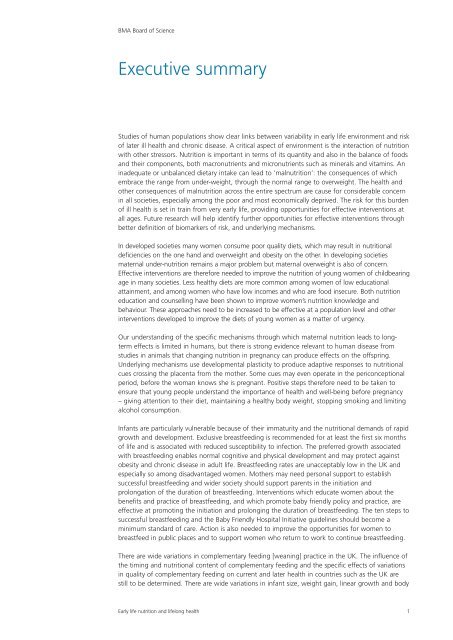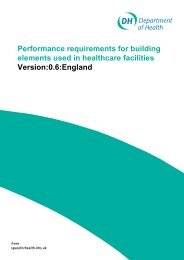Early Life Nutrition and Lifelong Health - Derbyshire Local Medical ...
Early Life Nutrition and Lifelong Health - Derbyshire Local Medical ...
Early Life Nutrition and Lifelong Health - Derbyshire Local Medical ...
Create successful ePaper yourself
Turn your PDF publications into a flip-book with our unique Google optimized e-Paper software.
BMA Board of ScienceExecutive summaryStudies of human populations show clear links between variability in early life environment <strong>and</strong> riskof later ill health <strong>and</strong> chronic disease. A critical aspect of environment is the interaction of nutritionwith other stressors. <strong>Nutrition</strong> is important in terms of its quantity <strong>and</strong> also in the balance of foods<strong>and</strong> their components, both macronutrients <strong>and</strong> micronutrients such as minerals <strong>and</strong> vitamins. Aninadequate or unbalanced dietary intake can lead to ‘malnutrition’: the consequences of whichembrace the range from under-weight, through the normal range to overweight. The health <strong>and</strong>other consequences of malnutrition across the entire spectrum are cause for considerable concernin all societies, especially among the poor <strong>and</strong> most economically deprived. The risk for this burdenof ill health is set in train from very early life, providing opportunities for effective interventions atall ages. Future research will help identify further opportunities for effective interventions throughbetter definition of biomarkers of risk, <strong>and</strong> underlying mechanisms.In developed societies many women consume poor quality diets, which may result in nutritionaldeficiencies on the one h<strong>and</strong> <strong>and</strong> overweight <strong>and</strong> obesity on the other. In developing societiesmaternal under-nutrition remains a major problem but maternal overweight is also of concern.Effective interventions are therefore needed to improve the nutrition of young women of childbearingage in many societies. Less healthy diets are more common among women of low educationalattainment, <strong>and</strong> among women who have low incomes <strong>and</strong> who are food insecure. Both nutritioneducation <strong>and</strong> counselling have been shown to improve women’s nutrition knowledge <strong>and</strong>behaviour. These approaches need to be increased to be effective at a population level <strong>and</strong> otherinterventions developed to improve the diets of young women as a matter of urgency.Our underst<strong>and</strong>ing of the specific mechanisms through which maternal nutrition leads to longtermeffects is limited in humans, but there is strong evidence relevant to human disease fromstudies in animals that changing nutrition in pregnancy can produce effects on the offspring.Underlying mechanisms use developmental plasticity to produce adaptive responses to nutritionalcues crossing the placenta from the mother. Some cues may even operate in the periconceptionalperiod, before the woman knows she is pregnant. Positive steps therefore need to be taken toensure that young people underst<strong>and</strong> the importance of health <strong>and</strong> well-being before pregnancy– giving attention to their diet, maintaining a healthy body weight, stopping smoking <strong>and</strong> limitingalcohol consumption.Infants are particularly vulnerable because of their immaturity <strong>and</strong> the nutritional dem<strong>and</strong>s of rapidgrowth <strong>and</strong> development. Exclusive breastfeeding is recommended for at least the first six monthsof life <strong>and</strong> is associated with reduced susceptibility to infection. The preferred growth associatedwith breastfeeding enables normal cognitive <strong>and</strong> physical development <strong>and</strong> may protect againstobesity <strong>and</strong> chronic disease in adult life. Breastfeeding rates are unacceptably low in the UK <strong>and</strong>especially so among disadvantaged women. Mothers may need personal support to establishsuccessful breastfeeding <strong>and</strong> wider society should support parents in the initiation <strong>and</strong>prolongation of the duration of breastfeeding. Interventions which educate women about thebenefits <strong>and</strong> practice of breastfeeding, <strong>and</strong> which promote baby friendly policy <strong>and</strong> practice, areeffective at promoting the initiation <strong>and</strong> prolonging the duration of breastfeeding. The ten steps tosuccessful breastfeeding <strong>and</strong> the Baby Friendly Hospital Initiative guidelines should become aminimum st<strong>and</strong>ard of care. Action is also needed to improve the opportunities for women tobreastfeed in public places <strong>and</strong> to support women who return to work to continue breastfeeding.There are wide variations in complementary feeding [weaning] practice in the UK. The influence ofthe timing <strong>and</strong> nutritional content of complementary feeding <strong>and</strong> the specific effects of variationsin quality of complementary feeding on current <strong>and</strong> later health in countries such as the UK arestill to be determined. There are wide variations in infant size, weight gain, linear growth <strong>and</strong> body<strong>Early</strong> life nutrition <strong>and</strong> lifelong health 1



